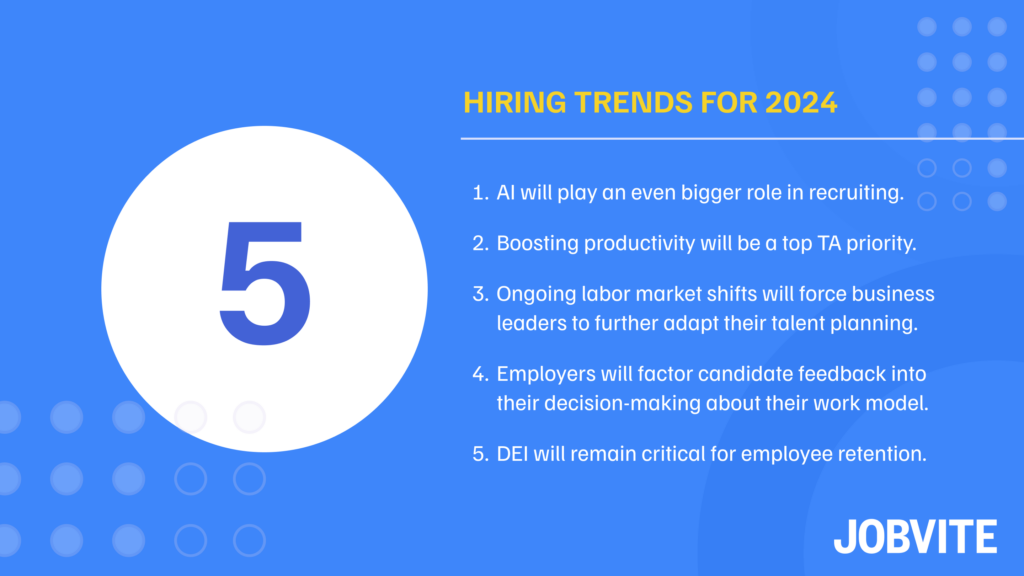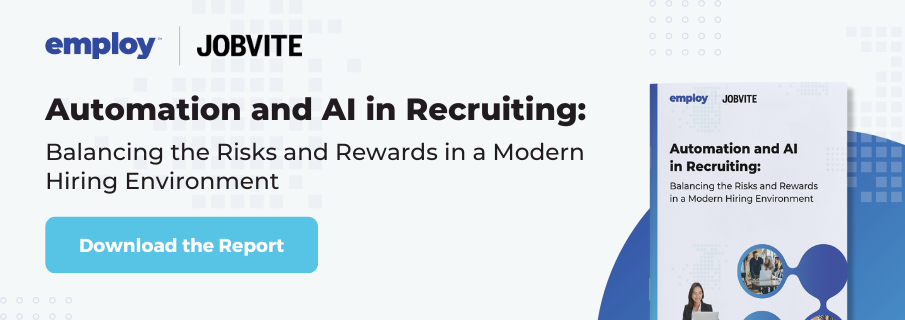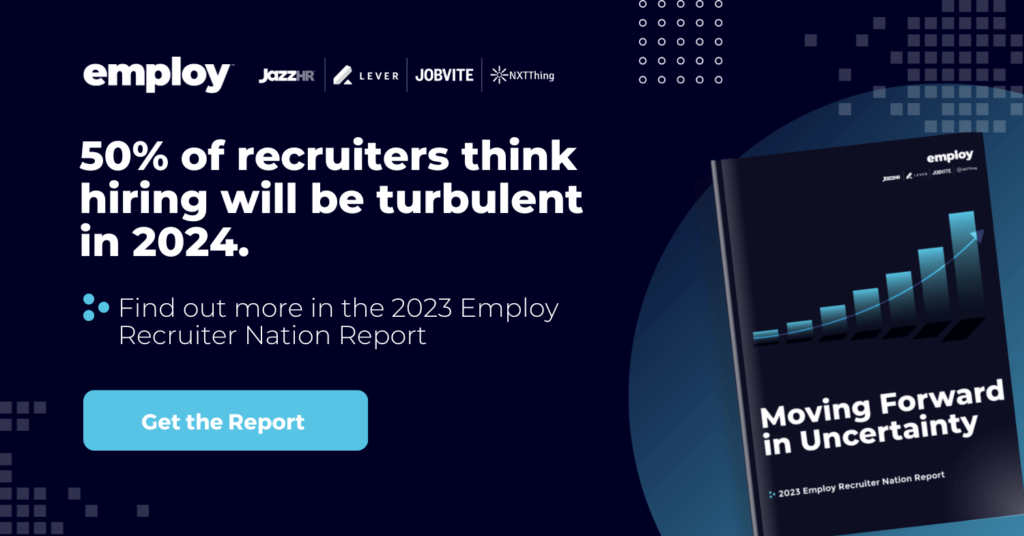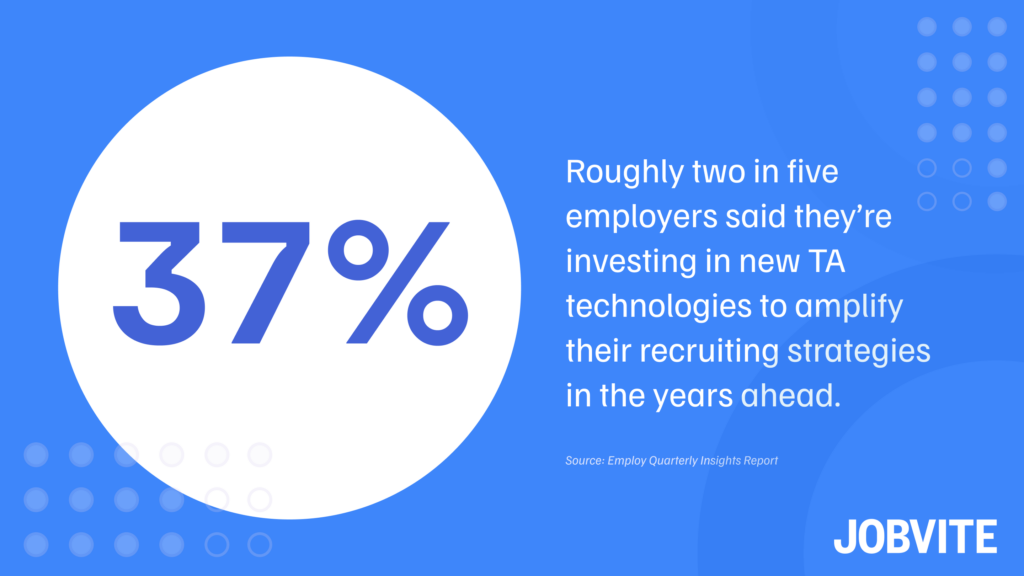Closely monitoring hiring trends is a shared task for C-level executives, including human resources and talent acquisition leaders, as well as hiring managers and recruiters.
Regularly analyzing labor market data and tracking TA and workplace changes made by other employers helps hiring stakeholders develop and refine annual workforce plans, revamp their hiring processes, and prepare their recruiters to fill future roles more effectively.
Here, you will find hiring trends and recruiting insights that can help inform your company’s talent planning strategy for 2024, as you gear up your recruiting function for next year.
5 hiring trends to know in 2024
Gartner noted human resources leaders will empower their employees in 2024 by:
- Offering leadership and management training
- Upgrading their organizational culture
- Implementing new change management processes
- Making internal mobility a bigger priority
To improve their approach to talent acquisition, CHROs are also closely tracking these five hiring trends and factoring them into their companies’ headcount planning for the year ahead.

1) Artificial intelligence will play a bigger role in recruiting and hiring
Driving better recruiting and hiring outcomes with AI was a top priority for employers in 2023.
Moving forward, companies will explore even more AI use cases to automate administrative tasks, more quickly review resumes, and better engage job applicants and passive candidates.
Moving forward, companies will explore even more AI use cases to hire smarter.
Recruiters and hiring managers will use advanced AI recruiting technology to more quickly review resumes, mitigate hiring bias, and engage job applicants and passive candidates.
“Allowing AI to do the behind-the-scenes work frees recruiters to focus on the relationship-driven aspects of the hiring process to ensure the match is suitable for both the candidate and the company,” talent acquisition expert Jack Kelly recently wrote for Forbes.
Employ’s 2023 Automation and AI in Recruiting report noted the “human element of recruitment remains crucial.” However, talent teams can “significantly enhance the effectiveness of recruitment strategies” by leveraging AI-powered tools to streamline manual, repetitive tasks.
Many enterprises continue to invest in applicant tracking systems (ATS) to streamline their hiring process and complement their talent acquisition teams’ recruitment marketing, employer branding, candidate sourcing, and pipeline management.
Expect more of these large-scale businesses to look for powerful, yet intuitive recruiting software that offers artificial intelligence capabilities as well in 2024.
While adoption is increasingly important for enterprises, Employ CEO Pete Lamson cautioned executives will need to put guardrails in place around their use of AI for recruiting.
“As technology advances … new [AI recruiting] use cases may arise,” Pete wrote for Forbes. “Leaders should implement a regular review of best practices to ensure that they are keeping up with …new safeguards that software developers integrate into their products.”

2) Improving productivity will be a primary focus for talent teams
Investing in AI is just one way talent leaders plan to boost recruiters’ performance in 2024. Many TA leaders also intended to use data more often to elevate their teams’ output.
The Employ 2023 Recruiter Nation Report found 24% of employers will invest more in reporting and analytics technology to enhance their data-driven recruiting and hiring processes.
“For talent acquisition professionals, getting a handle on their [recruiting and hiring] analytics, creating visibility, and shining a light on the most vital aspects of their performance is critically important,” Employ’s Data-Driven Recruiting Handbook stated.
Look for more enterprises to use analytics to improve key recruitment metrics, including their:
- Sourcing and nurturing effectiveness
- Application completion rates
- Hiring manager and candidate satisfaction
- Structured interviewing speed
- Recruiting quality and efficiency
- Talent pipeline and hiring diversity
Addressing these facets of their full-cycle recruiting will help TA teams fill job openings with high-quality job seekers more effectively. Just as important, it will also increase their hiring productivity and better contribute to business growth goals.

3) Leaders will adjust talent planning amid ongoing job market shifts
The labor market has experienced a lot of volatility in recent years:
- Employers adapted to a candidate-centric market during the COVID-19 pandemic.
- The hiring landscape shifted again in 2022. Some of those individuals who quit during The Great Resignation began looking for work again.
- In 2023, some sectors saw frequent layoffs, which provided employers who continued to hire with more qualified candidates to consider.
More market changes are likely to come in 2024. It remains to be seen who these changes will favor — employers or candidates — or whether companies will restart their hiring initiatives.
However, many enterprises are preparing for an eventual return to normal hiring conditions by reevaluating their current and future headcount needs and factoring those in their 2024 talent planning.
TalentLab VP of Talent Operations Sarah Doughty told SHRM that recruiters must ensure clear communication with hiring managers as new requisitions open in 2024.
“Just as the hiring manager will be able to provide helpful feedback on the job scope, the recruiter is there to provide equally useful feedback about the market,” said Sarah.
Communicating daily regarding open roles will help both parties ease back into hiring processes they may not have executed consistently together in some time.

4) Employers will adjust work models to better attract candidates
Recruiters pull a lot of levers to get qualified candidates into the recruiting funnel, including writing inclusive job descriptions, posting job ads to proven sourcing channels, and proactively reaching out to individuals with relevant skills and backgrounds.
And yet, this isn’t enough to convince some job seekers to apply and passive candidates to agree to join a screening call. A common reason these candidates don’t convert is the lack of flexible work options for employees offered by the employers in question.
As return-to-office (RTO) requirements increase, “maintaining open communication and addressing concerns transparently [are] vital to successful implementation [of RTO],” YouParcel Founder Onur Kutlubay recently told ResumeBuilder.
More employers will carry out RTO plans in 2024. However, others will assess whether the move is right for their organizations, based on candidate feedback data that reveals job seekers’ sentiment about in-office, work-from-home, and hybrid work models.
“There’s a growing divide,” Gartner Jamie Kohn Senior Research Director recently explained to SHRM. “As companies have shifted their policies around RTO and shifted productivity expectations, we’re seeing employees feeling less loyal to remain.”

5) DEI will remain critical to culture and retention improvements
Some companies appear willing to scale back on diversity, equity, and inclusion and employee experience initiatives in 2024. Many employers, though, remain committed to making further progress with their DEI programs, including those tied to hiring.
The return on investment from this DEI focus can pay big dividends with hiring.
Eagle Hill Consulting research shows 53% of job seekers want to see a lot of DEI progress from potential employers before considering joining their business.
That figure rises to 63% for Millennial candidates and 77% for Gen Z prospects.
Coordinated DEI programs don’t just positively impact recruiting. Boston University School of Public Health Associate Professor Monica Wang noted it also bolster employee retention.
“Thinking about recruitment and retention and the overall health of an organization, creating inclusive and equitable work environments can actually facilitate success in those outcomes,” said Monica.
Given this, and the fact 50% of HR decision-makers intend to spend more on DEI technology to drive related programs, according to the Employ Recruiter Nation Report, expect more employers to reconsider slashing their DEI budgets and, instead, double down on initiatives.
Accelerate your enterprise recruiting process and scale your hiring strategy with the Jobvite Evolve Talent Acquisition Suite. Schedule a demo of our TA technology today.





